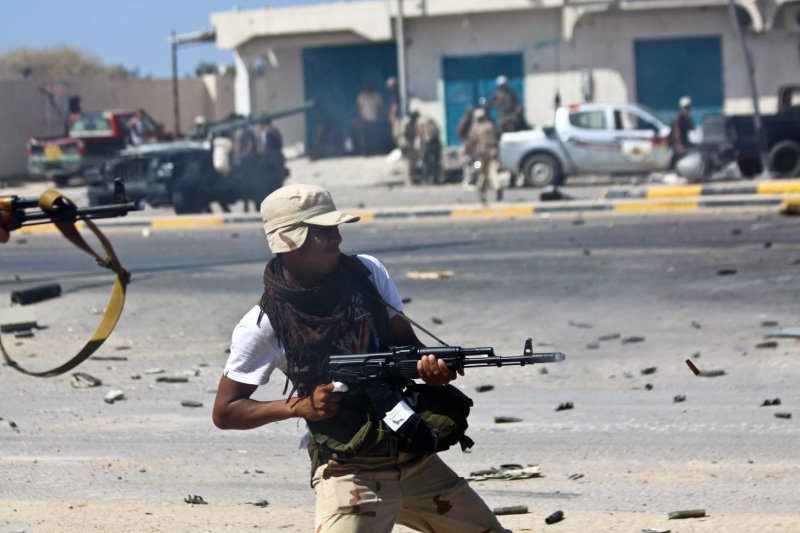1 of 10 | A member of Libya's ruling National Transitional Council (NTC) fires at pro-Gaddafi forces during clashes in eastern Libya, September 24, 2011. Fighters for Libya's interim rulers entered Moamer Kadhafi's hometown of Sirte today in a surprise assault that NATO said it backed to halt brutal acts by followers of the ousted regime. UPI/Amru Taha |
License Photo
TRIPOLI, Libya, Sept. 26 (UPI) -- NATO aircraft bombed the hometown of ousted Libyan leader Moammar Gadhafi as reports surfaced of a mass grave in Tripoli, rebel leaders said.
The National Transitional Council forces prepared to press forward into Sirte Monday, a day after NATO aircraft strafed the ground, al-Jazeera reported.
"NATO has dropped a lot of bombs today [Sunday]," one NTC fighter told the network. "You can see the planes up above."
NTC forces during the weekend pushed to within a few hundred yards of Sirte, among the last strongholds of pro-Gadhafi resistance in Libya, but pulled back in advance of the NATO airstrikes, rebel leaders said.
"Yesterday our freedom fighters attacked Sirte city from two sides. That doesn't mean that Sirte is free now, but it is an indication that Sirte will be free soon," said Ahmed Bani, an NTC military spokesman in Tripoli.
However, al-Jazeera reported NTC fighters on the outskirts of Sirte had to pull back after encountering resistance. An NTC commander told al-Jazeera the forces withdrew because they didn't have the manpower to hold territory and sustained several deaths.
Meanwhile, reports from Tripoli indicate a mass grave was uncovered at a prison in Tripoli, The New York Times reported.
Provisional government officials said they found the grave behind Abu Salim prison after interrogating former prison security guards.
No one could tell with certainty whether the remains were human, the Times said. Dozens of bones were collected, including bones that looked to be animal.
In 1969, more than 1,200 prisoners were massacred at Abu Salim prison when the inmates demanded better conditions.
Ibrahim Abushima, a doctor investigating mass graves in Libya, said international assistance would be needed to help excavate the site and analyze any remains.















